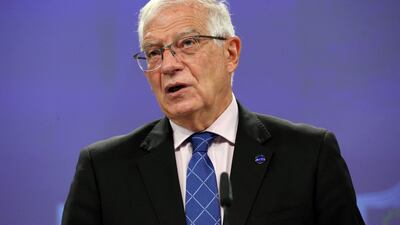The European Parliament has called on Brussels to propose a list of individuals and authorities eligible for sanctions, in a very public piling up of pressure on Lebanon’s political class.
In an extraordinary resolution passed on Thursday afternoon, the parliament described the unfolding crisis in Lebanon as “a man-made disaster caused by a handful of men across the ruling political class,” while calling for the quick implementation of sanctions as per a new regime announced by Brussels at the end of July.
The motion passed by a landslide, with 575 votes in favour, securing cross-party support and seeing off a last-minute effort by socialist groups within the parliament to water down the threat of sanctions on Lebanon.
The resolution called for an EU observation mission for Lebanon’s scheduled elections and gave a warning “that elections in May 2022 must by no means be postponed”.
The motion described Lebanon as being in “the state of institutional breakdown” and proposed “an International Humanitarian Task Force under the auspices of the United Nations in order to support the implementation of humanitarian assistance and oversee the use of the funds”.
Christophe Grudler, the French MEP leading the resolution said the EU could not afford to wait for months.
“We need strong sanctions and quick sanctions in order to move on and have a better future in Lebanon,” he told The National shortly before the vote.
“If there are no sanctions, there will be no progress. If there are no sanctions, people who are involved in the bad use of money will continue to do so.”
He said that implementing sanctions would be vital for Lebanon to gain desperately needed international support.
“It’s impossible for the international community to give money if it is ending up in the pockets of certain people,” he said.
“After that we can continue to have discussions with the IMF, there will be money from the EU, of course, but first we must see the end of corruption. It is impossible to let them continue with this behaviour.
“It’s a resolution for the Lebanese people,” he said.
Mr Grudler is a member MoDem, a centrist party in coalition with French President Emmanuel Macron’s En Marche party.
Yet speaking earlier in the week, the EU's foreign policy chief Josep Borell, addressing the parliament in Strasbourg, appeared more willing to give the new government formed by Prime Minister Najib Mikati a grace period to demonstrate its willingness for reforms.
The motion increases pressure on Lebanon’s political class as EU member states begin drawing up lists of names liable to be hit by a sanctions regime announced at the end of July.
The EU’s push for sanctions was led by France and Germany, with the UK and US also in the process of preparing their own sets of sanctions on Lebanese politicians. Anyone sanctioned by Brussels would be subject to visa bans and frozen assets.








